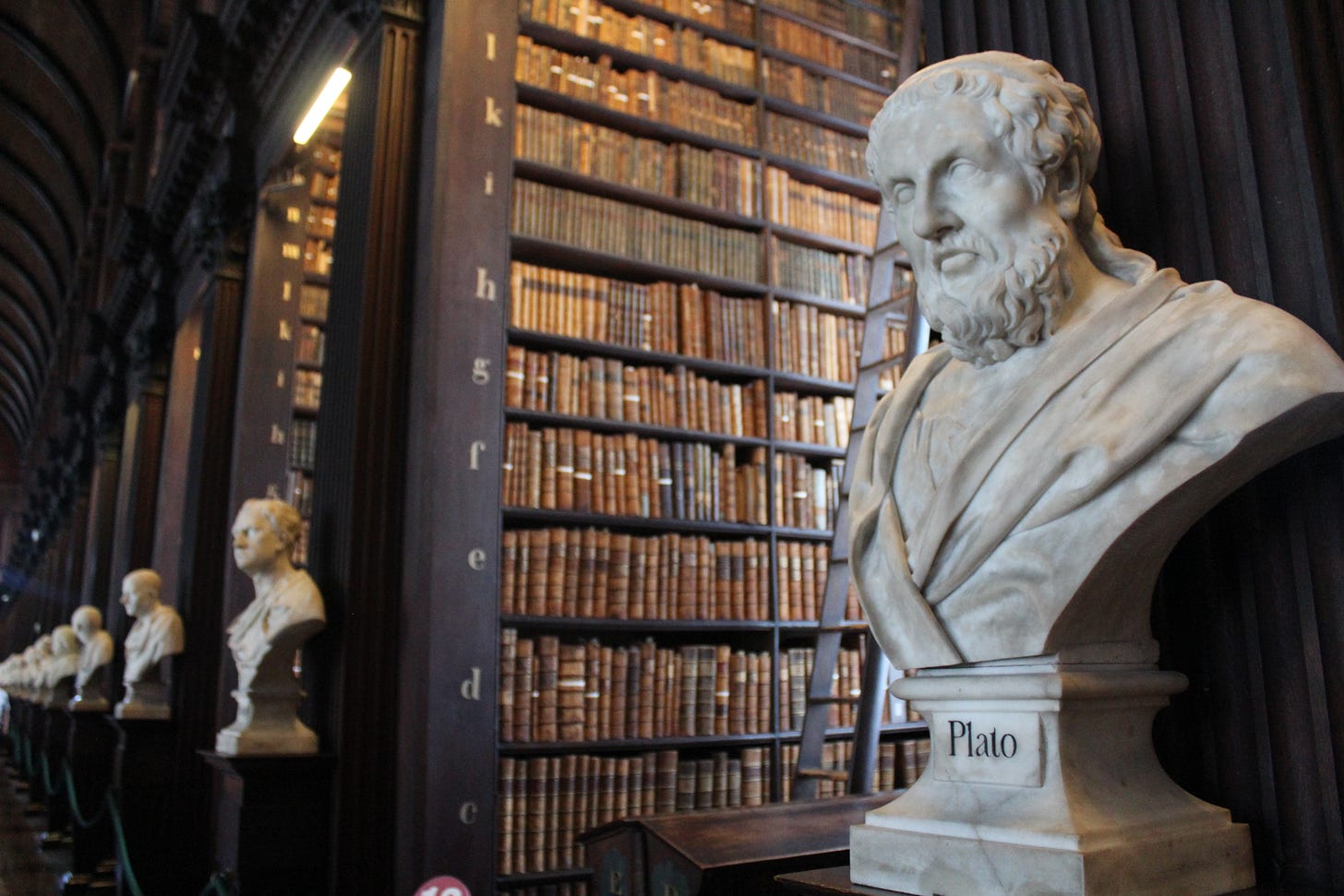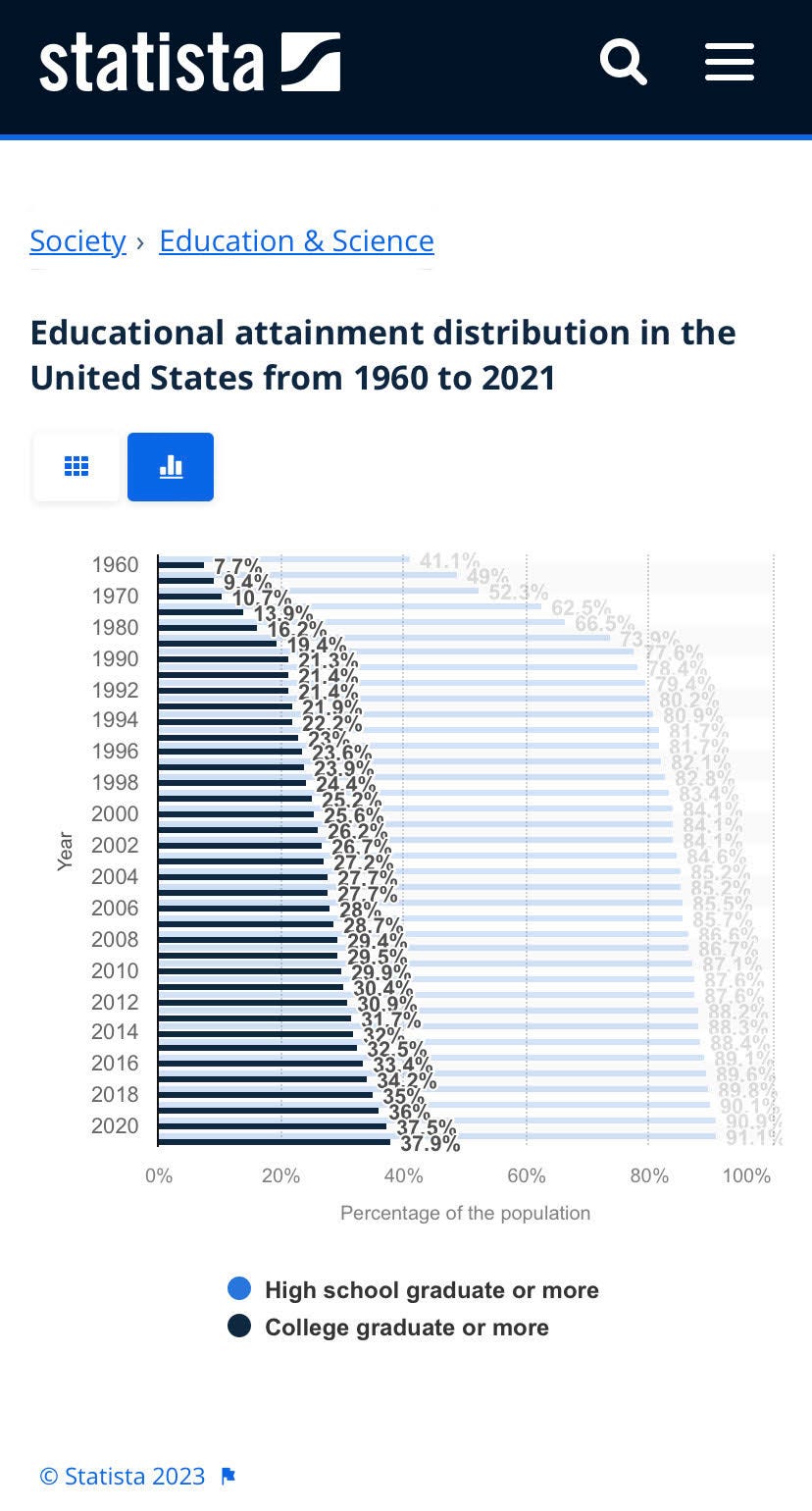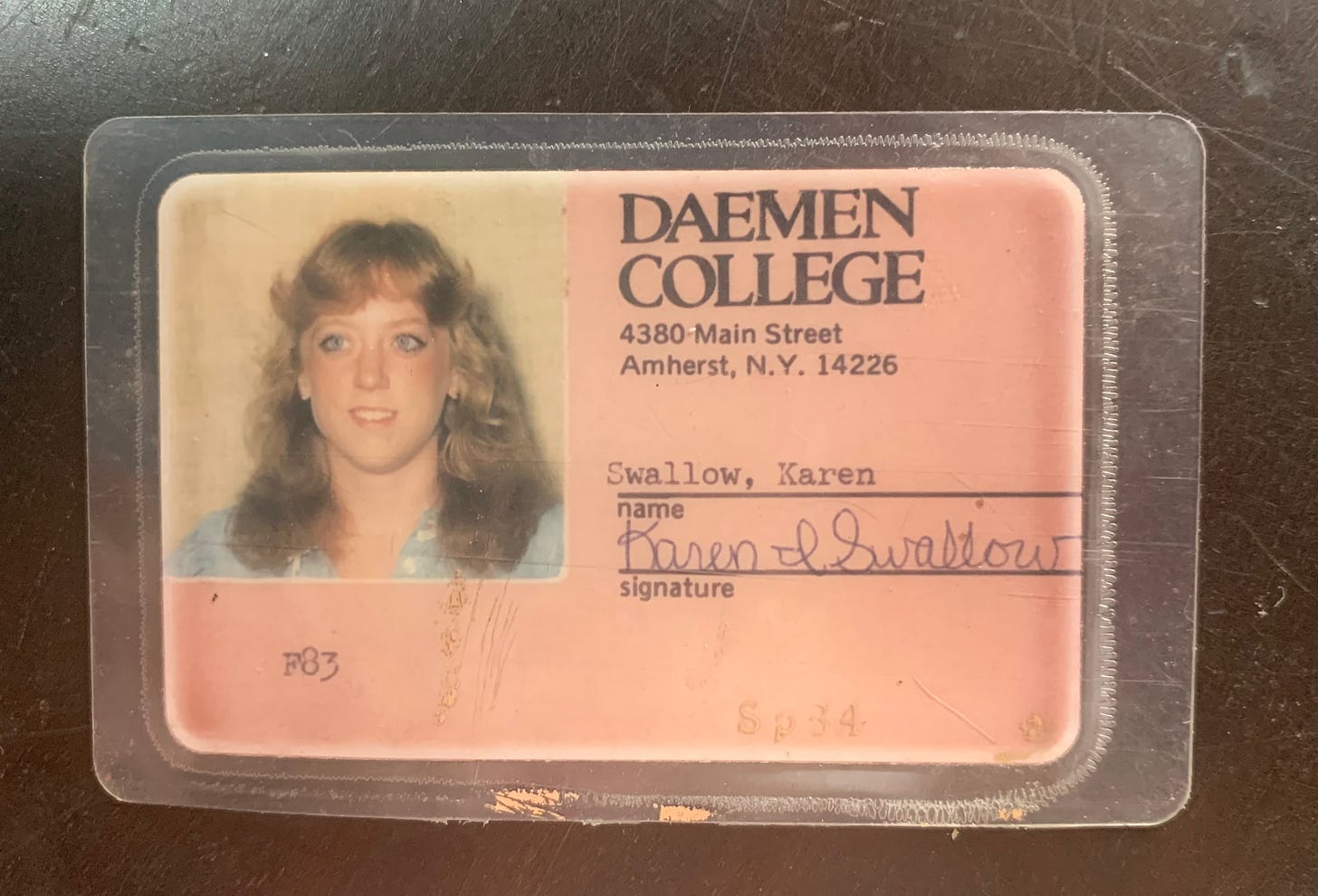Getting Schooled
What is higher education for?
Plato bust at the Trinity College Library in Dublin, Ireland: I got to visit this school (and see the Book of Kells!) long ago while studying in Ireland one summer during college because—get this!—I was the only one to apply for the scholarship which paid for all the expenses. Amazing. It was an experience of a lifetime. [Photo by Geraldine Davila Gonzalez]
"Absolutely unmixed attention is prayer.” – Simone Weil1
Next week, my experiment in “teaching” British literature here begins. If you missed that, we are starting with Beowulf (which you can read here—and the same translation is available on Audible, I recently learned). I don’t know how many installments I will give it. As I said to someone on the internets, I’m not sticking to a schedule! (It’s not on the syllabus because there is no syllabus!) Now, please keep your expectations low so as not to be disappointed! There is no way I can replicate in a short weekly newsletter what happens in a classroom—the many words spoken, the questions asked, the spontaneous insights shared, the conversation and laughter. None of these (except perhaps a few of the words) can be translated onto the page. But we shall see what we can do, dear reader, together. Yes, we shall.
But last week, I said I wanted to say some things about higher education first. I have many thoughts on that topic! Yet, again, I can offer just a few of them here.
Higher education is in a crisis and it’s only going to get worse. You can google the reports yourself. Now, I’m no economic or policy expert, but I’ve watched what’s happened over four decades. Tuition rates have increased far many more times than the rate of inflation and that is directly tied to the increases in government-funded student loans. I will never forget hearing a student tell me that she didn’t know why she had so much money in her bank account. Turns out the loan people had calculated her expenses and were pouring money into her account that she didn’t need—but that she, or we, would have to pay back. And I never understood why there were so many complaints about textbook costs (so tiny compared to tuition) until I realized that loans cover tuition, not textbooks. To stem parent complaints, one institution where I taught put a policy in place restricting the textbooks faculty could require according to cost—while tuition continued to be raised. I told one administrator: it’s like you’re building a mansion but telling the construction workers they must buy their nails at the dollar store. The quality of the material being taught (which includes the books!) is the whole point.
Here’s a brief explanation for the skyrocketing tuition. (Hint: it’s not professor salaries and perks.) The key quote is this: “With nearly no limit on the amount students can borrow to help cover the rising cost of college, ‘there is an incentive to drive up tuition’.”
But what is tuition paying for?
A residential college education requires professors, classrooms, labs, and books today—just as it did 50 years ago. But now instead of military bunker-style dorms, most schools offer luxurious apartments. Instead of lukewarm cafeteria food, students get gourmet dishes made to order. Then there are the ski slopes, rock climbing walls, indoor rivers, state-of-the art fitness centers, and Olympic-sized pools. I don’t understand how parents and students can look at these facilities and still wonder why a college degree costs so much. You aren’t just paying for lectures on Plato and lessons in physics. College has become on many campuses four years of luxury living away from home. Cruise ship accommodations without the ship. Classes, lectures, and textbooks are a sideshow.
In response to skyrocketing tuition, entire industries have sprung up to allow students to get college credit while in high school through various means. But this is merely being penny wise and pound foolish. Everyone seems to think it’s a good way to game the system (and to feel like their child is extra smart—after all, he or she is taking “college-level” classes!). But no one seems to be asking the reverse: why are so many college classes now basically high school level? And why are we collectively paying twice for the same education? Taxpayers pay for public school (parents for private school) and then we all fund government loans for colleges … that are teaching more and more high school-level classes.
Much of this is occurring because too many adults (parents, teachers, guidance counselors, school administrators) are laboring under the once-true-but-now-outdated mid-twentieth century idea that a college degree was an automatic golden ticket to success. This was certainly truer when only 8% of the population had a four-year degree. But the laws of supply and demand confer a different value when more like 40% of the population has a four-year-degree.2 Today’s Bachelor’s degree is yesterday’s high school diploma, and today’s Master’s degree is yesterday’s Bachelor’s degree … and so on. This bubble must burst.
Here’s the thing: I am (obviously) a huge advocate of higher education. I devoted my entire life to it. But it is not the only way to live. Nor is it the best path for everyone for “success”—or, more importantly, fulfillment of a calling. Just ask all the graduates working at Starbucks and trying to pay off $100,000 in student debt. They were sold a bag of goods. Shame on us.
But as with all things, we must consider the telos of education. If the purpose of going to college is to achieve a certain income (nothing wrong with that), then the math better be right. If the purpose is a certain career, then all the avenues to that career should be explored. Too many students are pushed into pursuing a four-year liberal arts degree when their gifts and passions are more oriented to working with their hands than to reading Nietzsche. (Full disclosure: my husband teaches building trades. This conversation is a frequent one in our household.)
And don’t get me started on the doctoral degree pyramid scheme through which aspiring scholars get doctorates (increasingly online) and are then employed to teach as adjuncts for cheap in order to produce more doctoral degree graduates who then … You get the picture.
Of course, I believe in education for education’s sake. But I don’t believe in going into a lifetime of debt in order to get an education and 24-hour access to a fitness room.
The value of any degree—any education—is in who it helps you to become.
A liberal arts degree (which is what most four-year institutions offer) is so-called because traditionally the liberal arts center on the subjects that were studied by free (“liberated”) people rather than enslaved people or servants. Such an education is indeed a luxury, one not to be taken for granted. A liberal arts education has always been oriented to who such an education allows one to become not what it can teach one to do. Who you become has almost everything to do with what you do and how you do it, of course. But the point is that if you spend your life paying off a debt because you thought the degree would help you do something then that will assuredly affect who you are free to become.
The education bubble will burst on account of greed and short-sightedness, compounded by the baby bust that will result in what experts are calling the “enrollment cliff”— a drastically smaller pool of college age students starting in 2025. Like all good things, higher education will rebuild itself. But how long that will take, what such rebuilding will look like, and what will happen in the meantime remain to be seen. Colleges all over are closing. More closures will come.
In addition to colleges closing, the humanities are taking egregious hits. I’ve seen many reports over the past few years of colleges eliminating philosophy majors and language majors, including English. (Honestly, there are so many recent reports, I couldn’t even begin to link the headlines. Some of you may want to share examples you know of in the comments.) This all makes me incredibly sad because, as I said, I devoted my entire life to higher education. I began teaching college English as a PhD student when I was 24 years old. That was 34 years ago! (You can do the math!)
My ID card from my freshman year of college! I didn’t know how to look at the camera then, either.
But this also doesn’t bode well for any of us. The study of the humanities taps into the things that make us human. Such study cultivates critical thinking, communication skills, problem solving abilities, and basic understanding of the human condition and ourselves. These are the qualities that prepare us not only for work but for life. As I have often explained to prospective English majors, such study doesn’t lead to one door in the way a nursing degree or accounting certificate does. Rather, it leads to a hall that has many doors—any one or more of which you can open.
Such an education is priceless. But it also costs. And we need to count the costs. All of them.
Simone Weil, Gravity and Grace, trans. By Emma Crawford and Mario von der Ruhr (London: Routledge, 2002), 117.
https://www.statista.com/statistics/184260/educational-attainment-in-the-us/





As a 75 year old who attended college for only one semester in 1966 and the husband of a woman who holds a master's degree, I read your post with a combination of sadness and nostalgia. I had always desired to return to school because I loved the idea of academic engagement. Nevertheless I found my "education" down non-formal pathways. Books became my professors and I loved my glued and bound instructors. Today, as a missionary teacher/encourager, I delight in carrying out my calling to encourage front-line pastors and workers in the nations in the spirit and power of Isaiah 50:4. Thank you for your writing!
Thank you for “pulling back the curtain”on higher education. As a professor in a graduate school for over 20 years, your insights ring sadly true to my experience.